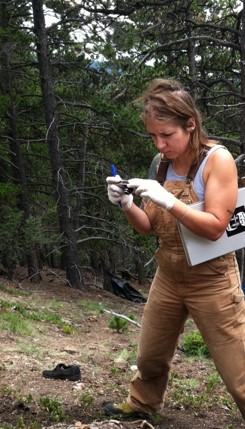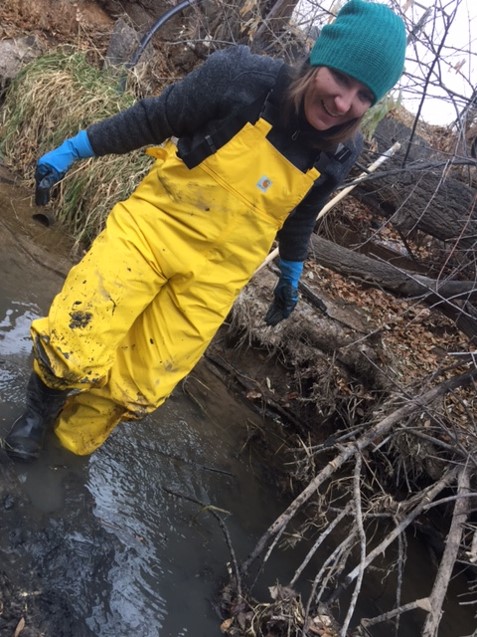December 06, 2018
With the help of a recent grant, student conducts research on decomposition patterns in high altitudes
CARBONDALE, Ill – Body decomposition may not be a very popular conversation point, but when law enforcement officials are in the middle of a forensic investigation or recovery mission, the topic becomes one of extreme importance. Seeing just how vital this information is for solving complex cases, SIU anthropology student Christiane Baigent is out to improve upon the current research.
To support her research, Baigent recently received over $100,000 from the National Institute of Justice’s Graduate Research Fellowship program. The funds set Baigent up to take the next step in her unique study.
Research focuses on high altitude changes
Baigent came to Southern Illinois University Carbondale after studying and working with coroners, law enforcement officials, and the Forensic Investigation Research Station at Colorado Mesa University in Colorado. While working in the field, she noticed an important gap in research when it came to body decomposition in higher altitudes.
“My research started because I was working in the Rocky Mountain region first as an undergraduate intern, then with my master’s degree, consulting for law enforcement,” Baigent said. “I spent several years doing that, and in the course of that I saw that the patterns of decomposition at high altitude were very different than widely accepted, published material.”
While this difference may not seem immediately significant, it can directly impact the results of an investigation. The goal for Baigent is to develop predictive models to estimate how much time has elapsed since a person has died.
To do this, she is working to establish macroscopic patterns of decomposition. Understanding the sequence and rate of soft tissue changes allows anthropologists to make a more informed estimate of postmortem interval (time since death) and may also inform cause and manner of death.
Altitude can affect decomposition rates
While research is available on a variety of regions and situations, it has largely been performed in the southeast United States; no work had been done on the impact of high altitude on the decomposition process.
“High altitude has more direct UV exposure, lower temperatures, different scavenger guilds, and the partial pressure of atmospheric gasses is different,” Baigent said. “So that’s going to affect a cascade of biological processes, from how a body releases gasses to how tissues degrade. Not everything dies at the instant of medical death - cells, protein molecules, amino acids, and enzymes degrade at different rates which will be affected by these environmental variables.”
Understanding the process of decomposition is a long study, but one that is necessary to make conclusive decisions on many cases. That’s why Baigent feels it is so important to bridge the research gap and build a knowledge base for these scenarios.
“This will be the only research using human remains, absolutely, that has been performed in a controlled way at high altitude and in these high altitude environmental conditions,” Baigent said.
Work aids law enforcement
One of the main jobs of a forensic anthropologist is to assist with search and recovery of human remains, and then help to identify remains by providing the medical examiner information regarding age, sex, ancestry, stature and circumstances surrounding death. The goal of this research is to come up with models to understand how long a body has been on the ground in order to determine other investigative factors.
“One of the things that really informs an investigation is answering ‘how long has this person been out there?’” Baigent said. “Has it been months, has it been years? Because so many variables affect how decomposition progresses, it’s not a straightforward process.”
Generally, forensic anthropologists are consulted by medical examiners or coroners when there is not enough tissue left for the remains to be informative to them.
“Once you have passed the point of soft tissue having any analytical value, they pass on the hard parts (bone) on to us,” Baigent said.
Baigent is working to ensure the results are truly conclusive, even when factoring in changes due to unique altitudes and the environmental variables within.
Research will begin this summer
This upcoming summer, Baigent plans on heading back to her hometown region of Colorado to jump into the hands-on element of the research. After working in the region off and on over the last several years, Baigent has experimented with sample tests to build her hypothesis and hone in on her specific focus. Her preliminary research shows a big difference between decomposition at higher and lower altitudes, with decomposition faster at the higher altitudes.
“I think compared to what we see on the lower slope of Colorado, where remains desiccate, it will be faster,” Baigent said. “But more important, the sequence and presentation of soft tissue dissolution diverges from well accepted sequences.”
The research is valuable not only for her specific region, but other areas with similar altitude.
“The goal and the hope is that this is applicable not only through the Rocky Mountain chain, which extends from Canada down to New Mexico, but anywhere you are moving up in altitude,” Baigent said.
Collaborative work
With such a big project, Baigent feels fortunate to have excellent support from not only SIU, but also the Forensic Investigation Research Station (FIRS) at Colorado Mesa University and the Colorado Park County Commissioners and Coroner’s Office. Working together, Baigent received 40 acres of land, now a FIRS satellite facility, to conduct her research, and continuing support and approved donations from FIRS.
While completing her doctoral program, Baigent is working under Gretchen Dabbs, associate professor of biological anthropology, at SIU’s Complex for Forensic Anthropology Research (CFAR). The team is currently conducting research within the curated osteological collection, and in the field assessing decomposition. The research experience provides Baigent the foundation she needs as she builds toward understanding the full impact of decomposition in various regions.


